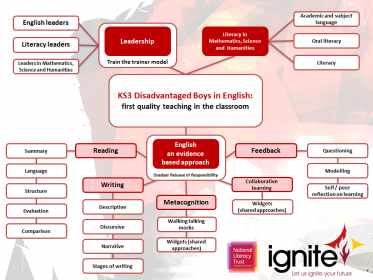DISADVANTAGED BOYS IN KS3 ENGLISH
SSIF Project Overview
“To be literate is to gain a voice and to participate meaningfully and assertively in decisions that affect one’s life. To be literate is to gain self-confidence. To be literate is to become self-assertive…Literacy enables people to read their own world and to write their own history… Literacy provides access to written knowledge – and knowledge is power. In a nutshell, literacy empowers”
Y Kassam, ‘Who benefits from illiteracy? Literacy and empowerment’ in The Challenge of Illiteracy: from Reflection to Action
“Good literacy skills provide us with the building blocks not just for academic success, but for fulfilling careers and rewarding lives. Yet despite our best efforts, a disadvantaged child in England is still more than twice as likely as their classmates from more advantaged homes to leave primary school without reaching the expected levels in reading and writing.”
Sir Kevan Collins, Chief Executive, Education Endowment Foundation
We whole-heartedly believe reading and writing is the bedrock of the curriculum and if disadvantaged boys become proficient in these skills they will succeed not only in English, but across the curriculum. Our project specifically targets first quality teaching in English lessons and is complimented by a whole school approach to literacy, with a specific focus on Mathematics, Science and Humanities.
We have designed our Year 8 curriculum for disadvantaged boys to foster a love of reading and writing, and to prepare not only disadvantaged boys, but all students for both the rigours of key stage 4 English and crucially beyond post 16 student education.
Our curriculum is evidenced based as it is underpinned by a synthesis of approaches advocated for disadvantaged learners by the Education Endowment Foundation (EEF). We will be transposing recommendations from the EEF’s guidance reports on ‘Improving Literacy in Key Stage Two’ and ‘Metacognition and Self-Regulated Learning’. This will be strengthened through embedding collaborative learning and feedback strategies as recommended by the EEF toolkit for disadvantaged learners. Crucially, the gradual release of responsibility model provides the foundation of these approaches so disadvantaged boys, and all students, develop high levels of independence.

Key principles embedded throughout the project
The programme includes a fully resourced curriculum of lessons plans, lesson resources and an e-forum to enable collaboration. Underpinned by a train the trainer model, leaders will cascade training within their own contexts and have bespoke SLE support to embed approaches.
Sustainability is at the heart of our project, effectively developing both learning and teaching to ensure successful outcomes for all students.
